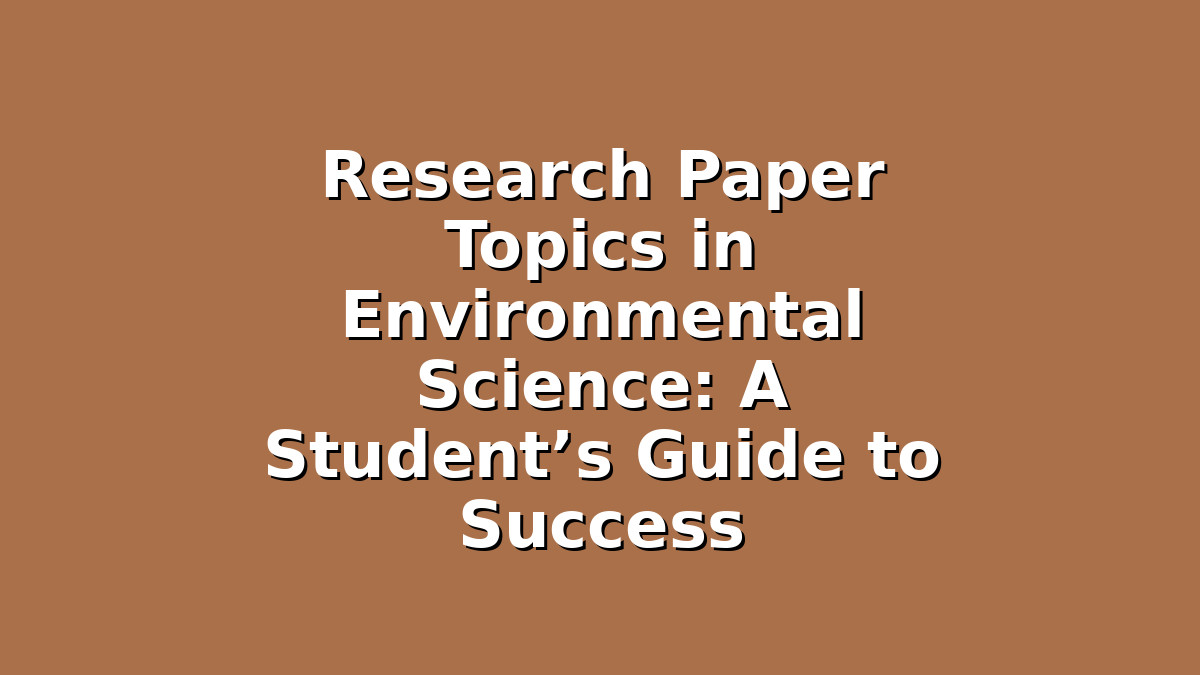Environmental science is an exciting and rapidly growing field that explores the relationship between humans and the natural world. For students preparing for exams or working on research papers, choosing the right topic is crucial. A well-chosen topic not only sparks your interest but also allows you to dive deep into important issues affecting our planet today. This guide will help you find compelling research paper topics in environmental science and provide effective study tips to ensure your success.
Understanding the Importance of Choosing the Right Topic
Before jumping into writing your paper, it’s vital to select a topic that aligns with both your interests and the scope of your assignment. Environmental science covers a broad range of subjects, from climate change and pollution to conservation and renewable energy. When you pick a topic that excites you, studying becomes more enjoyable and your enthusiasm will shine through in your writing.
To start, review the guidelines given by your instructor. Are you expected to focus on a particular subfield like ecology, environmental policy, or sustainable development? Narrowing your focus early on helps prevent feeling overwhelmed later. Additionally, consider the availability of research materials and data. Access to credible sources will make your research process smoother.
Section 1: Popular Research Paper Topics in Environmental Science
To inspire your brainstorming, here are some popular and impactful topics you might consider:
1. Climate Change and Its Global Impact
Explore how rising temperatures affect ecosystems, weather patterns, and human societies. You can focus on causes like greenhouse gas emissions or consequences such as melting glaciers and extreme weather events.
2. Renewable Energy Solutions
Investigate the potential of solar, wind, and hydroelectric power to reduce dependence on fossil fuels. You might analyze the benefits, challenges, and future prospects of renewable energy in mitigating environmental degradation.
3. Plastic Pollution and Marine Life
Examine how plastic waste enters oceans and affects marine organisms. Research possible solutions like biodegradable alternatives, recycling programs, or international policies targeting plastic reduction.
4. Deforestation and Biodiversity Loss
Study the causes behind deforestation, such as agriculture and urban expansion, and its impact on wildlife habitat and species extinction. Include conservation efforts and sustainable forestry practices.
5. Water Scarcity and Management
Analyze factors contributing to water shortages globally and look into innovative water-saving technologies, policies, and community initiatives aimed at sustainable water use.
When choosing from these or other topics, think about what questions you want to answer. Are you interested in scientific data, policy analysis, or community action? Defining your angle early makes research more focused and manageable.
Section 2: Study Tips for Tackling Environmental Science Research Papers
Writing an effective research paper requires more than just picking a topic. Here are some study strategies to help you stay organized and confident throughout the process:
– Create a Research Plan
Break your project into manageable steps: topic selection, preliminary research, outlining, drafting, and revising. Set deadlines for each phase to avoid last-minute stress.
– Use Reputable Sources
Rely on academic journals, government reports, and reputable environmental organizations for accurate information. Websites ending with .edu, .gov, or .org are often trustworthy starting points.
– Take Organized Notes
While researching, keep detailed notes with proper citations. Use digital tools like Zotero or Evernote to organize references and avoid plagiarism.
– Formulate Clear Research Questions
Define what you want to discover or prove. Clear questions guide your research and make your paper more focused and compelling.
– Discuss With Peers or Instructors
Don’t hesitate to ask for feedback or clarification when stuck. Study groups or office hours can provide valuable insights and motivation.
– Practice Time Management
Allocate regular study sessions and avoid distractions. Small, consistent efforts yield better results than last-minute cramming.
Section 3: Writing and Revising Your Environmental Science Paper
After gathering your research, it’s time to write. Follow these tips to craft a well-structured and impactful paper:
– Start with a Strong Introduction
Introduce your topic, explain its importance, and state your thesis clearly. A good introduction sets the tone for the rest of your paper.
– Develop Body Paragraphs with Evidence
Each paragraph should focus on a single idea supported by data, examples, or expert opinions. Use graphs, charts, or images if allowed to enhance understanding.
– Connect Ideas Smoothly
Use transition words and phrases to maintain a logical flow. This helps readers follow your argument effortlessly.
– Address Counterarguments
Acknowledging opposing views shows critical thinking and strengthens your position.
– Conclude Effectively
Summarize your main points and emphasize the significance of your findings. Suggest areas for further research or action if relevant.
– Proofread and Edit
Check for grammar, spelling, and formatting errors. Reading aloud or using tools like Grammarly can help catch mistakes.
– Seek Feedback
Have a teacher, peer, or mentor review your draft. Constructive criticism can improve clarity and quality.
Conclusion
Writing a research paper in environmental science is a valuable opportunity to learn about critical issues facing our planet while developing your academic skills. Remember to choose a topic that interests you, plan your study time wisely, and approach the writing process with a clear structure. With dedication and these helpful tips, you’ll not only succeed in your exams but also gain knowledge that empowers you to make a positive impact on the environment.
Stay curious, keep exploring, and trust in your ability to produce great work. Your research paper could be the first step toward becoming an environmental advocate or scientist making a real difference.

Responses